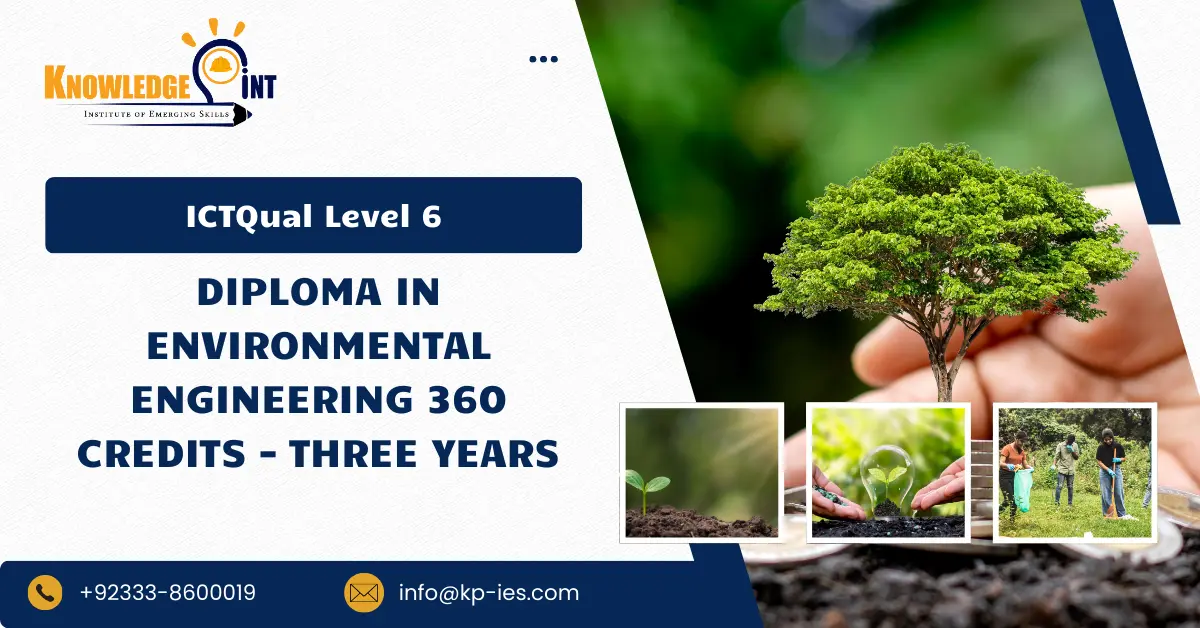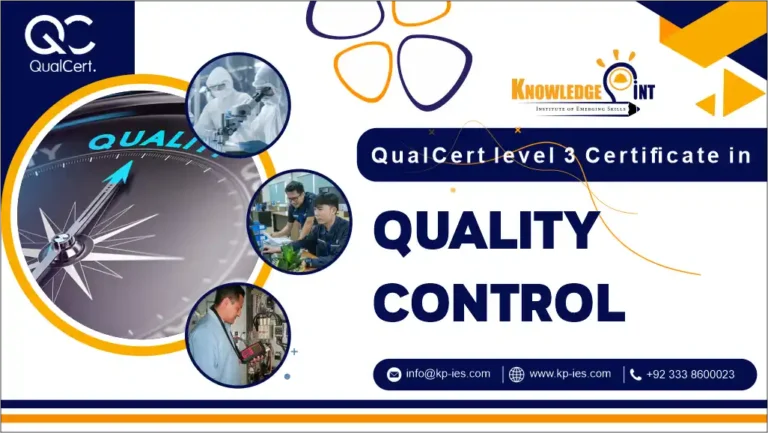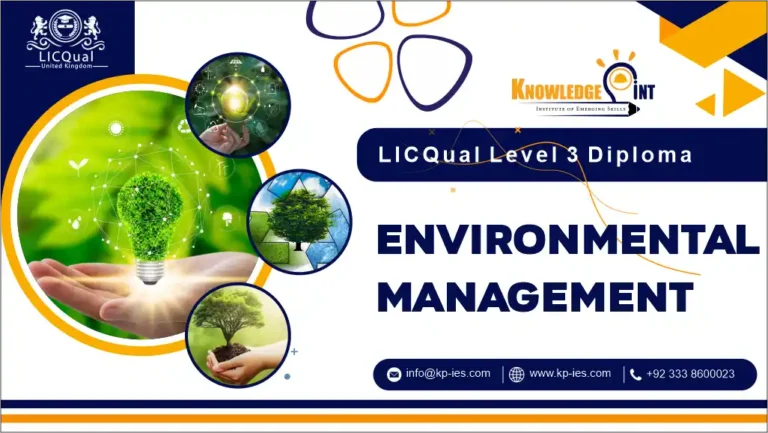Are you passionate about solving environmental challenges and building a sustainable future? The ICTQual Level 6 Diploma in Environmental Engineering offers a comprehensive three-year program designed to equip students with the knowledge, skills, and practical experience needed to address critical environmental issues. This 360-credit qualification provides in-depth training in areas such as pollution control, water resource management, renewable energy, and sustainable design, preparing you to make a real impact in the field of environmental engineering.
The ICTQual Level 6 Diploma in Environmental Engineering is a rigorous and holistic program that blends theoretical knowledge with hands-on experience. Over three years, students will explore the core principles of environmental engineering, advanced technologies, and sustainable practices. The curriculum is designed to address real-world environmental challenges, focusing on innovation, problem-solving, and leadership.
The ICTQual Level 6 Diploma in Environmental Engineering offers a robust and comprehensive pathway to a rewarding career in one of the most important fields of our time. Over three years, you’ll gain the skills, knowledge, and practical experience needed to tackle environmental challenges and drive sustainable innovation. If you’re ready to make a positive impact on the world, this program is your gateway to a fulfilling and meaningful career in environmental engineering.
Course Overview
The ICTQual Level 6 Diploma in Environmental Engineering 360 Credits – Three Years consists of 36 mandatory units which are as follows.
Year 1: Foundations of Environmental Engineering
- Introduction to Environmental Engineering
- Environmental Science Principles
- Basics of Environmental Chemistry
- Introduction to Renewable Energy Systems
- Mathematics for Environmental Engineers
- Engineering Mechanics and Materials
- Introduction to Fluid Mechanics
- Pollution Control and Prevention
- Environmental Regulations and Standards
- Soil Science and Geotechnical Engineering
- Introduction to Sustainable Development
- Communication Skills for Engineers
Year 2: Specialized Environmental Engineering Topics
- Advanced Water Supply and Wastewater Treatment
- Air Pollution Control and Management
- Waste Management and Recycling Techniques
- Hydrology and Water Resources Management
- Advanced Renewable Energy Technologies
- Environmental Impact Assessment (EIA)
- Risk Management in Environmental Engineering
- Environmental Economics and Policy
- Sustainable Infrastructure and Urban Planning
- Climate Change and Environmental Adaptation
- Environmental Data Collection and Analysis
- Environmental Project Management
Year 3: Advanced Studies and Practical Applications
- Sustainable Resource Management
- Advanced Environmental Chemistry
- Energy Efficiency and Green Technologies
- Environmental Monitoring and Data Systems
- Life Cycle Assessment and Eco-Design
- Green Building and Construction Techniques
- Environmental Biotechnology
- Environmental Law and Ethics
- Research Methodology in Environmental Engineering
- Environmental Engineering Design Projects
- Industrial Internship in Environmental Engineering
- Research Project and Dissertation
The future progression of the ICTQual Level 6 Diploma in Environmental Engineering 360 Credits – Three Years can lead learners towards several pathways, depending on their career goals and aspirations in the field of law and related sectors. Here are some potential avenues of progression:
Year 1: Foundations of Environmental Engineering
1. Introduction to Environmental Engineering
- Understand the fundamental principles and scope of environmental engineering.
- Identify key environmental challenges and engineering solutions.
2. Environmental Science Principles
- Explain the basic concepts of ecosystems, biogeochemical cycles, and ecological balance.
- Apply scientific principles to assess environmental impacts.
3. Basics of Environmental Chemistry
- Understand chemical processes in natural and polluted environments.
- Analyze environmental samples to detect and quantify contaminants.
4. Introduction to Renewable Energy Systems
- Identify different renewable energy sources and their applications.
- Evaluate the environmental benefits and limitations of renewable energy.
5. Mathematics for Environmental Engineers
- Apply mathematical principles in solving environmental engineering problems.
- Utilize statistics and calculus for data analysis and modeling.
6. Engineering Mechanics and Materials
- Understand the mechanical properties of materials used in environmental systems.
- Apply principles of mechanics to environmental engineering structures.
7. Introduction to Fluid Mechanics
- Understand fluid properties and behavior in environmental systems.
- Apply fluid mechanics concepts to water treatment and distribution.
8. Pollution Control and Prevention
- Identify sources of pollution and strategies for mitigation.
- Apply basic pollution control techniques for air, water, and soil.
9. Environmental Regulations and Standards
- Understand national and international environmental regulations.
- Apply regulatory frameworks to engineering projects.
10. Soil Science and Geotechnical Engineering
- Analyze soil properties and their impact on environmental projects.
- Apply geotechnical principles to sustainable land use and construction.
11. Introduction to Sustainable Development
- Explain the principles of sustainable development and their applications.
- Evaluate projects for their environmental, economic, and social impacts.
12. Communication Skills for Engineers
- Develop effective technical communication skills.
- Prepare and present environmental reports and proposals.
Year 2: Specialized Environmental Engineering Topics
1. Advanced Water Supply and Wastewater Treatment
- Design and evaluate water and wastewater treatment systems.
- Apply advanced techniques for purification and recycling.
2. Air Pollution Control and Management
- Identify air pollutants and their environmental impact.
- Design air pollution control systems for different industries.
3. Waste Management and Recycling Techniques
- Implement sustainable waste management strategies.
- Apply recycling techniques to reduce environmental impact.
4. Hydrology and Water Resources Management
- Understand the principles of hydrology and water resource planning.
- Develop solutions for water conservation and flood management.
5. Advanced Renewable Energy Technologies
- Evaluate emerging renewable energy technologies.
- Design systems incorporating renewable energy solutions.
6. Environmental Impact Assessment (EIA)
- Conduct EIA processes and prepare impact reports.
- Apply methods to predict and mitigate environmental impacts.
7. Risk Management in Environmental Engineering
- Identify and assess environmental risks in projects.
- Develop strategies for risk mitigation and management.
8. Environmental Economics and Policy
- Analyze economic aspects of environmental decision-making.
- Apply policy frameworks to promote sustainability.
9. Sustainable Infrastructure and Urban Planning
- Design sustainable urban infrastructure projects.
- Apply principles of green infrastructure and urban planning.
10. Climate Change and Environmental Adaptation
- Understand climate change science and mitigation strategies.
- Develop adaptation plans for vulnerable systems.
11. Environmental Data Collection and Analysis
- Collect, analyze, and interpret environmental data.
- Apply statistical tools for environmental research.
12. Environmental Project Management
- Plan, execute, and evaluate environmental projects.
- Develop leadership and management skills specific to environmental engineering.
Year 3: Advanced Studies and Practical Applications
1. Sustainable Resource Management
- Apply principles of sustainable resource use in engineering projects.
- Evaluate strategies for resource conservation and efficiency.
2. Advanced Environmental Chemistry
- Analyze complex chemical processes in polluted environments.
- Apply advanced chemical treatment methods for remediation.
3. Energy Efficiency and Green Technologies
- Design energy-efficient systems and integrate green technologies.
- Evaluate the environmental impact of energy use.
4. Environmental Monitoring and Data Systems
- Implement monitoring systems for air, water, and soil quality.
- Use data systems to manage environmental information.
5. Life Cycle Assessment and Eco-Design
- Conduct life cycle assessments to evaluate product sustainability.
- Integrate eco-design principles into engineering projects.
6. Green Building and Construction Techniques
- Apply sustainable practices in building design and construction.
- Evaluate materials and technologies for green buildings.
7. Environmental Biotechnology
- Understand biotechnological applications in environmental engineering.
- Apply bioremediation techniques for pollution control.
8. Environmental Law and Ethics
- Interpret environmental laws and ethical considerations in projects.
- Apply ethical practices in decision-making.
9. Research Methodology in Environmental Engineering
- Develop research proposals and conduct independent research.
- Apply scientific methods to environmental studies.
10. Environmental Engineering Design Projects
- Plan and execute comprehensive environmental design projects.
- Integrate multidisciplinary knowledge into practical solutions.
11. Industrial Internship in Environmental Engineering
- Gain practical industry experience through internships.
- Apply theoretical knowledge in real-world environmental projects.
12. Research Project and Dissertation
- Conduct in-depth research on a chosen environmental engineering topic.
- Present findings through a well-structured dissertation.
Course Benefits of the ICTQual Level 6 Diploma in Environmental Engineering 360 Credits – Three Years :
1. Comprehensive Knowledge and Skills
The course provides a broad foundation in agricultural engineering, combining essential knowledge in soil science, crop physiology, farm machinery, irrigation, and environmental sustainability. Graduates will be equipped with a diverse skill set that covers both the technical and theoretical aspects of modern agriculture. This multi-disciplinary approach ensures you can handle various challenges in the field.
2. Industry-Relevant Curriculum
The diploma is designed with input from industry professionals, ensuring that the curriculum remains aligned with the latest trends, technologies, and needs of the agricultural sector. With topics ranging from precision farming and renewable energy to advanced farm machinery and irrigation systems, students gain expertise in cutting-edge practices.
3. Hands-On Practical Training
The program includes practical training through workshops, fieldwork, and real-world projects. Students gain valuable hands-on experience with agricultural tools, machinery, and technology, allowing them to apply theoretical knowledge in practical settings. This ensures that graduates are work-ready and confident in their skills.
4. Career Flexibility and Opportunities
Graduates of the ICTQual Level 6 Diploma in Agricultural Engineering have a wide array of career opportunities in various sectors, including farming, agribusiness, machinery manufacturing, research, environmental consultancy, and renewable energy systems. The knowledge gained opens doors to positions such as agricultural engineers, farm management consultants, precision farming experts, and sustainability advisors.
5. Focus on Sustainability and Innovation
With increasing global concerns about food security, climate change, and sustainability, agricultural engineers are at the forefront of designing and implementing solutions that address these challenges. The diploma focuses on sustainable farming practices, climate-smart agriculture, renewable energy systems, and innovative technologies that help reduce agriculture’s environmental impact.
6. Strong Foundation for Further Education
For students interested in pursuing advanced degrees or specialized certifications, this diploma serves as a solid foundation for further studies in agricultural engineering, environmental science, or related fields. The research methods and final project component of the course also provide valuable experience for students who wish to pursue research roles.
7. High Demand for Agricultural Engineers
As the global agricultural industry increasingly relies on technology to improve productivity and sustainability, the demand for skilled agricultural engineers continues to rise. The course prepares graduates to meet this demand by equipping them with expertise in agricultural technology, automation, and resource management.
8. Contribution to Global Food Security
Agricultural engineers play a crucial role in addressing global food shortages, improving farming efficiency, and ensuring food security. By completing this course, you will be equipped to contribute to the development of innovative, sustainable solutions that increase agricultural productivity and support global food systems.
9. Exposure to Cutting-Edge Technologies
Students will be introduced to the latest agricultural technologies such as GPS, GIS, automation, and precision farming tools. With this exposure, graduates are prepared to lead in the field of agri-tech, using data-driven solutions to improve farming practices and operational efficiency.
10. Networking and Industry Connections
The program offers opportunities to connect with professionals, experts, and organizations in the agricultural engineering and agribusiness sectors. Networking during the course can lead to valuable internships, job opportunities, and collaborations, setting the stage for a successful career in the industry.
The ICTQual Level 6 Diploma in Environmental Engineering 360 Credits – Three Years offers numerous opportunities for progression, both academically and professionally. As the agricultural industry embraces technological advancements and sustainability, the skills and knowledge acquired from this course provide graduates with a variety of pathways to enhance their careers and contribute to shaping the future of agriculture. Below are the key progression routes:
1. Advanced Higher Education Opportunities
Postgraduate Degrees
Graduates of the ICTQual Level 6 Diploma have the opportunity to pursue postgraduate studies to further specialize in agricultural engineering or related fields:
- Master’s in Agricultural Engineering: Specializing in advanced agricultural technologies, machinery design, or sustainable farming practices.
- Master’s in Environmental Engineering or Sustainability: Focusing on sustainable agriculture, resource management, and climate change mitigation in the agricultural sector.
- Master’s in Precision Agriculture or Agri-Tech: Delving into technologies such as IoT, artificial intelligence, and data-driven farming systems.
- Research-Based Programs: Pursuing a research-focused master’s or PhD program to contribute to innovations in agricultural practices, technology, and food security.
Specialized Certifications and Diplomas
For further specialization, graduates may opt for certifications or diplomas in areas such as:
- Precision farming systems
- Agricultural automation and robotics
- Renewable energy applications in agriculture
- Irrigation systems design
- Agro-processing technologies
2. Professional Development and Certification
Industry-Specific Certifications
As the agricultural sector continues to evolve with new technologies, graduates can enhance their credentials by pursuing professional certifications, including:
- Certified Agricultural Engineer (CEngAgric): A certification that demonstrates professional competence in agricultural engineering.
- Certified Irrigation Designer (CID): Specializing in the design and management of irrigation systems.
- Project Management Certifications: Ideal for graduates interested in managing large-scale agricultural engineering projects. Certifications like PMP (Project Management Professional) or PRINCE2 are highly valued.
- Agri-Tech Specialist Certifications: As agricultural technology advances, certifications in areas like precision farming, automation, and digital farming tools are increasingly in demand.
3. Career Progression in the Agricultural Sector
Leadership Roles
Graduates with the ICTQual Level 6 Diploma can pursue leadership roles across a range of agricultural sectors, such as:
- Agricultural Engineer
- Farm Operations Manager
- Sustainability Consultant
- Technical Director in Agri-Tech Companies
- Agribusiness Manager
- Renewable Energy Systems Manager for Farms
Entrepreneurial Opportunities
Graduates can also take the entrepreneurial route by starting their own businesses or consultancy services. Potential areas for innovation include:
- Agricultural machinery design and manufacturing
- Irrigation system solutions
- Renewable energy installations for farms
- Smart farming solutions and sustainable agriculture practices
- Agro-processing services and solutions
4. Specialization in Cutting-Edge Agricultural Technologies
With the continuous advancement of technology in agriculture, graduates can specialize in emerging areas, including:
Agri-Tech Innovation
- Developing and implementing new technologies like drone-assisted farming, robotic harvesters, and autonomous tractors.
- Utilizing data analytics, machine learning, and artificial intelligence to improve farming practices and optimize resource use.
Climate-Smart Agriculture
- Designing solutions that help farmers adapt to climate change, such as water-efficient irrigation systems and resilient crop varieties.
- Promoting carbon-neutral farming and other environmentally-friendly agricultural practices.
Renewable Energy Integration
- Specializing in renewable energy systems for agriculture, such as solar, wind, and biogas solutions.
- Designing energy-efficient systems for farms to reduce operational costs and improve sustainability.
5. International Opportunities and Global Impact
Graduates of this diploma can also explore international career opportunities, where the demand for skilled agricultural engineers is high:
- International Development Projects: Work with global organizations, NGOs, or government agencies to implement sustainable agricultural practices in developing regions.
- Global Agri-Tech Companies: As the agri-tech sector grows worldwide, there are opportunities to work with companies that develop smart farming solutions and technologies.
- Collaboration with NGOs: Engineers can contribute to food security and agricultural development initiatives in regions facing challenges in food production.
6. Research and Innovation
For those interested in advancing the field through research, there are multiple opportunities to contribute to agricultural innovations:
- Agricultural Researcher or Scientist: Work with universities, research institutes, or private companies to develop new technologies and practices that improve productivity and sustainability in agriculture.
- Collaborative Projects: Participate in research projects that aim to improve agricultural practices through technology, sustainability, and innovation.
- Product Development: Work on developing new agricultural machinery, automation systems, and other innovative technologies that address the challenges facing modern farming.







